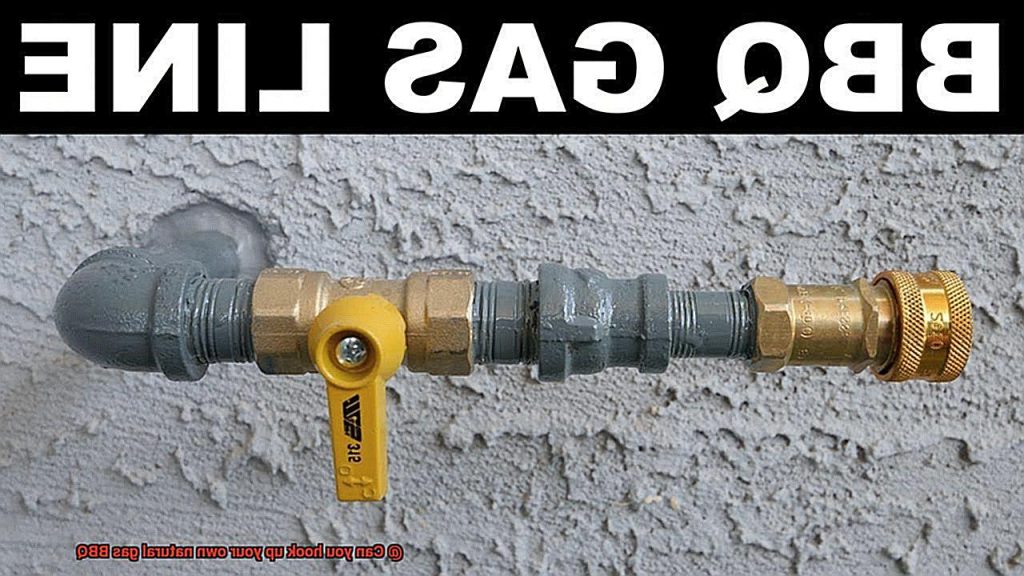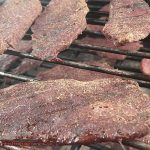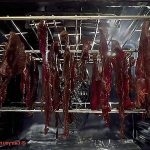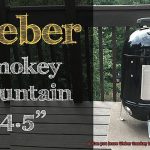Summer is just around the corner, and that means it’s time to fire up your BBQ and enjoy some delicious outdoor cooking. But if you’re a homeowner, you might be wondering whether you can hook up your own natural gas BBQ. The answer is yes, but it’s not as simple as just plugging it in and turning on the gas. There are specific requirements and safety precautions you need to consider before you start grilling.
More and more homeowners are choosing natural gas BBQs due to their convenience and cost-effectiveness. However, installing one isn’t as straightforward as setting up a propane or charcoal grill. Natural gas requires a dedicated gas line, which means you’ll need to install one if you haven’t already.
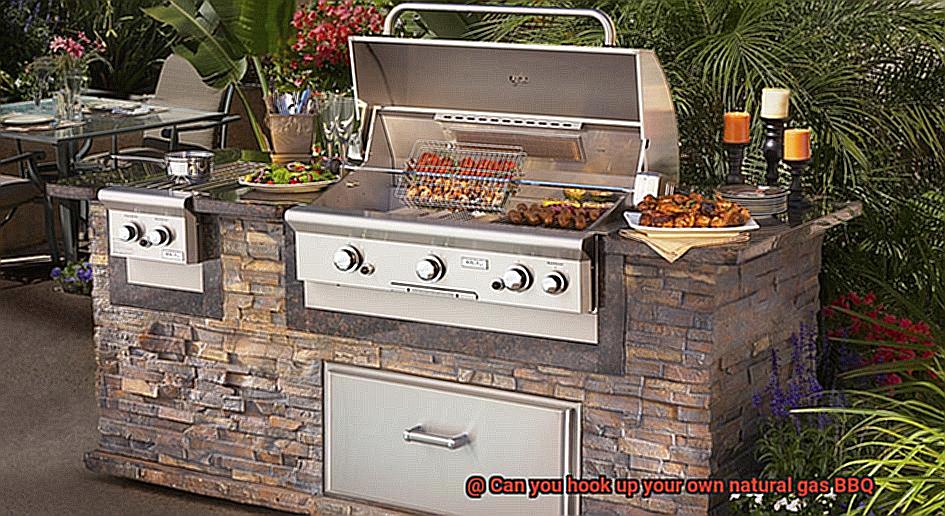
Before embarking on DIY installation, it’s crucial to understand the basic requirements and regulations surrounding natural gas BBQ hookup. There are strict safety codes and guidelines that must be followed to ensure your home’s safety and avoid potentially hazardous situations.
In this blog post, we’ll guide you through the steps of hooking up your natural gas BBQ safely and efficiently. We’ll cover everything from necessary tools and materials to techniques required for installation, along with guidelines on how to comply with local regulations and prevent potential safety hazards. So grab your apron, put on your thinking cap, and let’s get started.
Contents
What Is Natural Gas BBQ?
Put simply, a natural gas BBQ is an outdoor grill that uses natural gas as its fuel source instead of propane or charcoal. This fuel source is readily available in most urban areas through local utility companies and is cheaper in the long run. Plus, it produces fewer emissions than propane or charcoal, making it an environmentally friendly option.
Natural gas BBQs come in a variety of styles and sizes, from compact portable models to large outdoor kitchen setups. They typically feature durable stainless steel construction and multiple burners for precise temperature control. Many even come with additional features like rotisseries and side burners to take your grilling game to the next level.
However, unlike propane or charcoal grills, natural gas BBQs require a dedicated gas line connection. This means that you’ll need to make some modifications to your grill if you want to switch from propane to natural gas. Luckily, many modern natural gas BBQs come with a conversion kit that makes this process much easier.
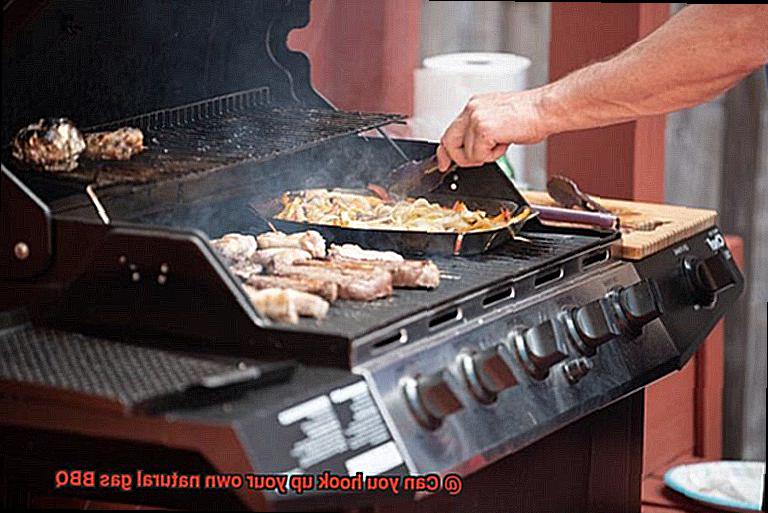
While it’s possible for homeowners to hook up their own natural gas BBQs, it’s highly recommended that they consult with a licensed professional first. Safety should always be the top priority when dealing with combustible fuels. By following the necessary steps and double-checking all connections, you can ensure a safe and enjoyable grilling experience.
Reasons to Hire a Professional for Installation
Installing a natural gas BBQ may seem like a walk in the park, but it’s crucial to remember that natural gas is a highly combustible substance that can pose serious safety risks if not handled correctly. That’s why hiring a professional for installation is highly recommended. Here are five reasons why:
Safety Is Paramount
Gas leaks can cause fires or even explosions, making safety the number one priority during installation. A licensed professional has the necessary knowledge and experience to ensure that the gas line is installed securely and safely, minimizing any potential risks.
Access to Specialized Tools and Equipment
Professional installers have access to specialized equipment and tools that may not be readily available to homeowners. This can make the installation process more efficient, effective, and less prone to errors or equipment damage.
Warranty Protection
Many manufacturers require their products to be installed by a licensed professional in order to maintain the warranty. If you try to install the BBQ yourself and something goes wrong, you risk voiding your warranty and being left without any protection. Hiring a professional installer ensures that your warranty remains valid, protecting you against any future issues.
Time and Hassle Savings
Installing a natural gas BBQ involves a complex process that requires knowledge of local codes and regulations. A professional installer will take care of all of these details for you, saving you time and hassle.
Peace of Mind
When you hire a professional installer, you can have peace of mind knowing that your BBQ is installed safely and legally. This allows you to fully enjoy your outdoor cooking experience without any worries or stress.
Steps to Take Before Installing a Natural Gas BBQ
Summer is the perfect time for grilling, and if you’re thinking of upgrading to a natural gas BBQ, there are a few essential steps you need to take before installation. As an expert in the field, I’m here to provide you with some helpful tips to ensure a safe and successful installation.
The first step is to confirm that you’re allowed to install a natural gas BBQ in your area. It’s important to check with your local building codes and regulations to avoid any potential issues. Once you’ve confirmed that you can proceed, it’s time to choose the perfect spot for your new BBQ. Selecting an open and well-ventilated location away from flammable materials or structures is crucial. You’ll also want to ensure that the natural gas line is within reach of your grill’s connection point.
Choosing the right size and type of natural gas line for your BBQ is a critical next step. Consulting with a licensed plumber or gas fitter will guide you through this process and ensure that you select the right line based on your grill’s size, BTU output, and distance from the natural gas source.
After selecting the correct line, it’s time to have it installed by a licensed professional. Always remember that natural gas can be dangerous if not handled correctly, so it’s crucial to leave this job to the experts. They’ll ensure that all necessary safety measures are in place, such as shut-off valves and proper securing of the gas line.
Before using your newly installed natural gas BBQ, it’s important to perform a leak test. This step is crucial for your safety, and should not be skipped. Simply spray soapy water on all connections and valves and check for any bubbles – if you see any, turn off the gas immediately and call in a licensed professional for repairs.
Purchasing the Necessary Equipment
Well, before you start cooking up a feast, you’ll need to ensure that you have all the necessary equipment. As an expert on purchasing the necessary equipment, I’ve compiled a comprehensive list of must-have items for hooking up your natural gas BBQ.
First and foremost, you’ll need to select a natural gas grill that is compatible with your home’s natural gas line. When shopping for a grill, consider factors such as size, features, and style to find the perfect match for your needs.
Once you’ve selected your grill, you’ll need a gas line that runs from your home’s natural gas source to the location where you’ll be installing your grill. This line should be installed by a licensed professional to ensure proper installation and safety.
To ensure safety while grilling, it’s essential to include a gas shut-off valve in your list of necessary equipment. This feature allows you to turn off the flow of gas to your grill in case of an emergency.
A gas regulator is another crucial piece of equipment that controls the pressure of the gas flowing into the grill and ensures safe and efficient operation. It’s important to choose a high-quality regulator designed specifically for use with natural gas grills.
Lastly, a gas flex line connects the grill to the gas line and allows for flexibility in positioning the grill. When selecting a flex line, make sure it’s made of durable materials and designed for use with natural gas grills.
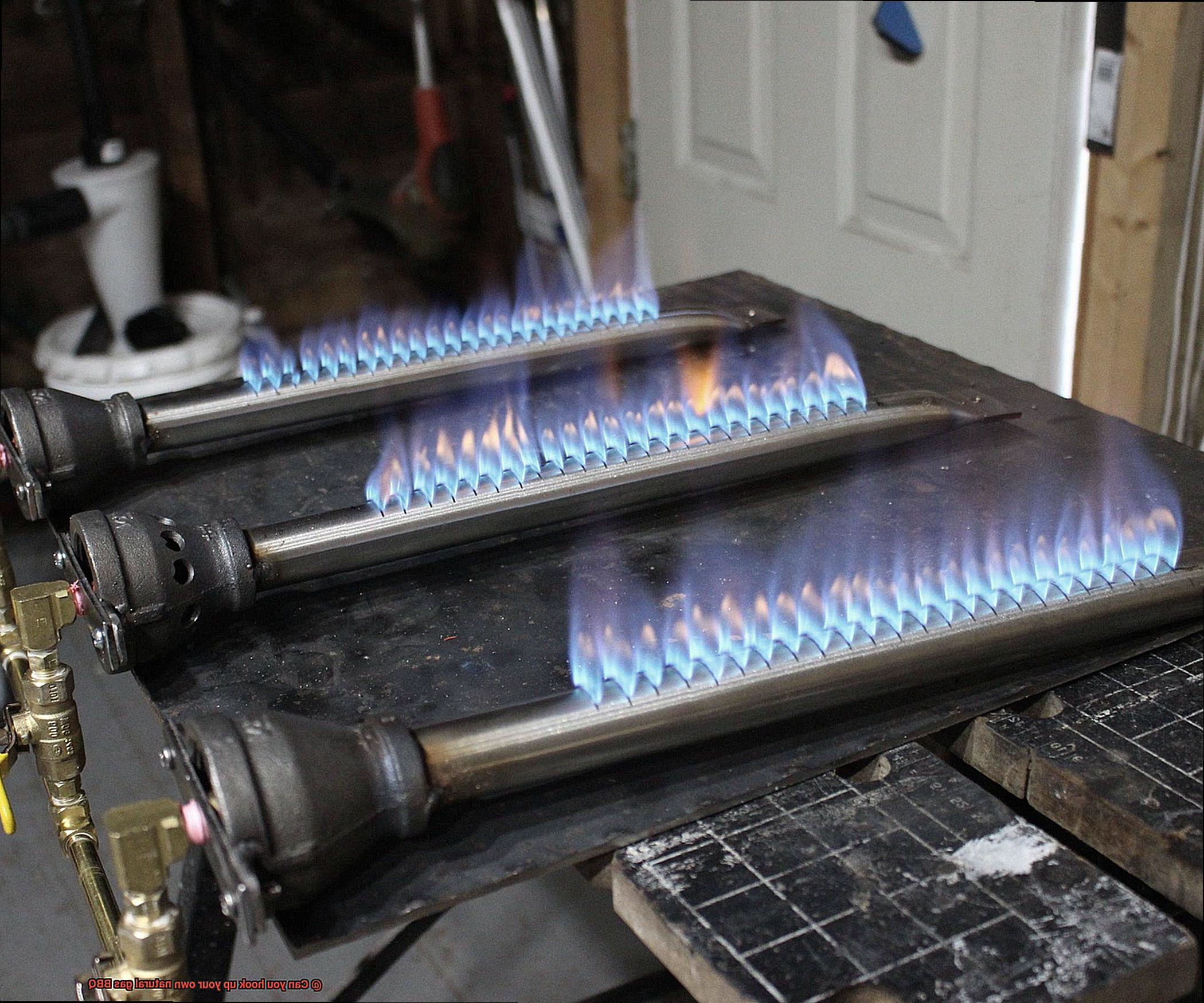
Remember to follow all manufacturer instructions and local building codes when installing your equipment. If you’re unsure about any aspect of the installation process, consulting a professional is always the best choice.
The Installation Process
The installation process may seem overwhelming, but fear not. With the right tools and knowledge, it can be done safely and efficiently. As an expert in this field, I have compiled some research notes to guide you through the process.
First and foremost, it is crucial to check with your local authorities to ensure that it is legal to install a natural gas BBQ in your area. Once you have received the green light, the next step is to purchase a natural gas conversion kit for your specific BBQ model.
Now let’s get started. Begin by turning off the gas supply and disconnecting any existing propane tanks. Then, attach the natural gas hose to the conversion kit and connect it to the gas supply line. To ensure a tight seal on all connections, make sure to use Teflon tape.
Safety first. Once all of the connections are secure, test for leaks by turning on the gas supply and spraying a soapy water solution on all connections. If bubbles begin to form, this indicates a leak and it must be addressed before proceeding further.
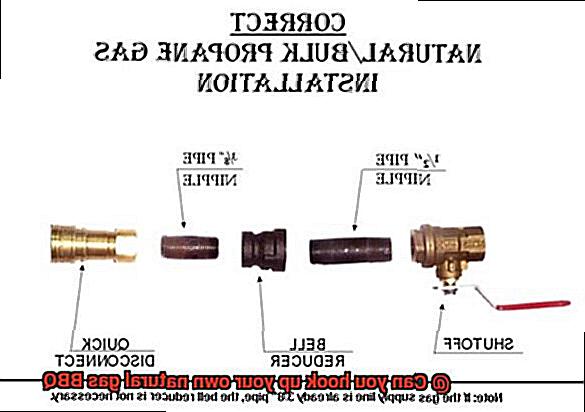
After confirming that there are no leaks, it’s time to attach the conversion kit to your BBQ and test the burners to ensure they are functioning properly. Remember to always follow manufacturer instructions and local building codes or consult a professional if unsure.
It is highly recommended that a professional technician performs a final inspection before using your natural gas BBQ for the first time. Safety should always be a top priority, so don’t skip this step.
In summary, installing a natural gas BBQ may seem like a daunting task but following these steps and taking necessary precautions will ensure a safe and successful installation. Here’s a quick recap:
- Check with local authorities.
- Purchase a natural gas conversion kit.
- Turn off gas supply and disconnect propane tanks.
- Attach natural gas hose and connect to gas supply line using Teflon tape.
- Test for leaks.
- Attach conversion kit to BBQ and test burners.
- Have a professional technician perform a final inspection.
Checking for Leaks
Before you start cooking, safety should be your top priority. You must check for leaks to avoid any potential harm or damage to your property. Don’t worry; we’ve got you covered with some essential tips and tricks.
First, gather all the necessary tools and equipment, including a gas leak detector solution, a pipe wrench, and a gas shutoff valve. These tools will come in handy when you’re checking for leaks. Once you have everything ready, turn off the gas supply valve and apply the gas leak detector solution to all the connections and joints.
Pay close attention as bubbles will appear around any areas where there is a leak present. If you notice bubbles forming, immediately turn off the gas supply valve and use a pipe wrench to tighten the connection. Reapply the detector solution to ensure that there are no more leaks.
Checking for leaks doesn’t stop at installation; it’s crucial to check for leaks periodically. Over time, natural gas BBQs are subject to wear and tear, which can lead to loosened connections and potential leaks. Regular maintenance and inspection ensure that your BBQ operates safely and efficiently.
To make sure you’re doing everything correctly, it’s recommended to have a professional inspect your natural gas line before installation. They will ensure that your natural gas line is up to code and can handle the additional load of your BBQ.
Safety Tips
Grilling on a natural gas BBQ can be a fantastic way to cook up mouth-watering meals for your loved ones. However, it is crucial to prioritize safety when using natural gas. Here are some essential safety precautions to consider when installing and using a natural gas BBQ.
Check for gas leaks
Before hooking up your BBQ, make sure to check all gas connections for any leaks. You can do this by applying a solution of soap and water to the connections and watching for any bubbles, which would indicate a leak. Even the slightest leak can lead to serious hazards, so it’s crucial to check carefully.
Use a licensed professional
It’s always best to hire a licensed professional to install or modify your gas line. This will ensure that everything is up to code and meets safety standards. If you do decide to do it yourself, make sure to obtain any necessary permits and follow local regulations.
Keep your BBQ away from combustibles
Make sure to place your grill at least 10 feet away from any flammable materials such as plants, wood structures, or propane tanks. This will help prevent accidental fires or explosions.
Never leave your BBQ unattended
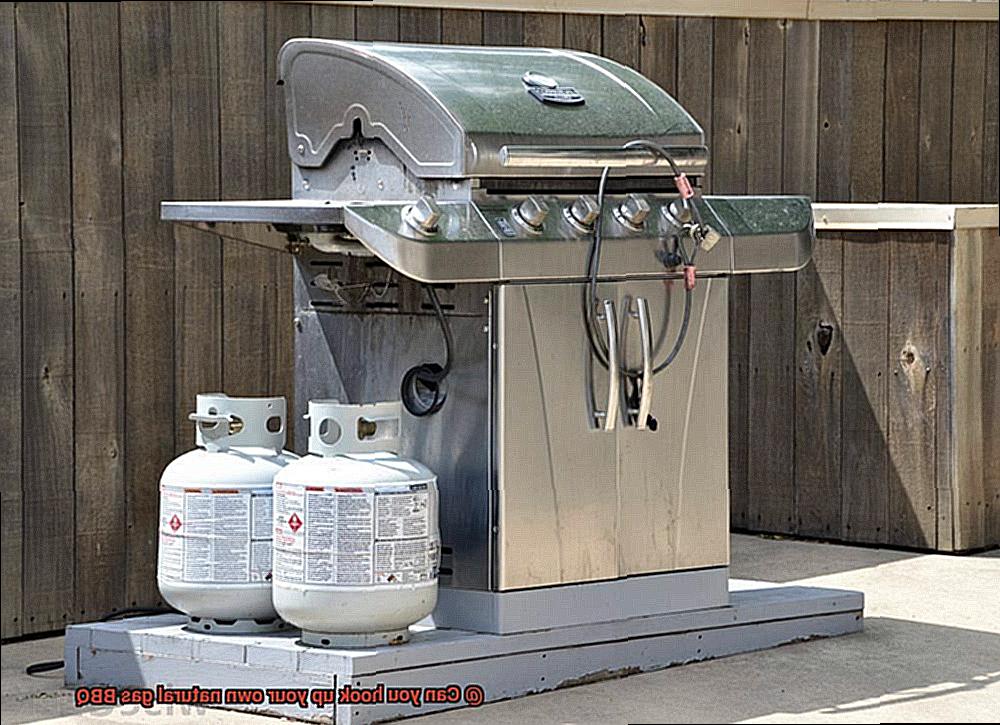
Always keep an eye on your BBQ when it is in use and never leave it unattended. It only takes a few seconds for a fire to start, so stay vigilant while cooking.
Keep a fire extinguisher nearby
In case of an emergency, always have a fire extinguisher nearby and know how to use it. A small investment in this safety measure could save lives and property in the future.
Before attempting to hook up your natural gas BBQ, educate yourself about the gas line and know how to properly shut off the gas supply in case of an emergency. It is also recommended that you use high-quality gas lines and fittings that are specifically designed for natural gas since using the wrong type of hose or fittings could lead to leaks or even explosions.
xLda3PhR9kQ” >
Conclusion
In conclusion, while it is possible for homeowners to hook up their own natural gas BBQ, it’s not a task to be taken lightly. Safety requirements and regulations must be strictly adhered to in order to avoid potentially hazardous situations and ensure your home’s safety. To avoid any mishaps, it’s highly recommended that homeowners consult with a licensed professional before embarking on DIY installation.
Natural gas BBQs offer many benefits such as convenience and cost-effectiveness compared to propane or charcoal grills. However, installing one requires a dedicated gas line which means you’ll need to install one if you haven’t already. Before installation, check local building codes and regulations to avoid any potential issues.
Hiring a professional for installation is highly recommended due to the safety concerns involved. Professionals have access to specialized tools and equipment, provide warranty protection, save time, and give peace of mind. The necessary equipment includes a natural gas grill compatible with your home’s natural gas line, a gas line installed by a licensed professional, a gas shut-off valve, a high-quality regulator designed specifically for use with natural gas grills, and a durable flex line.
When dealing with combustible fuels like natural gas, safety should always be the top priority. Periodically check for leaks and keep your BBQ away from combustibles while never leaving it unattended. Keep a fire extinguisher nearby in case of an emergency.

